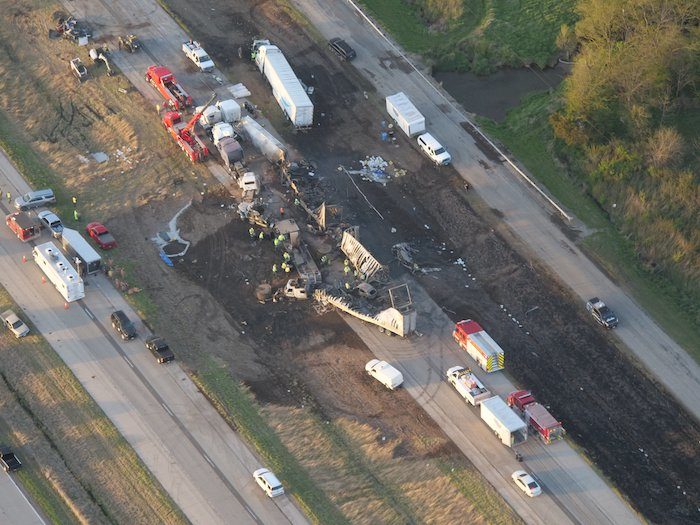At least 7 people were killed in a massive crash involving over 70 cars along a 2-mile stretch on Interstate 55 in central Illinois May 1. The crash was caused by excessive winds blowing dirt from recently tilled farm fields, which lead to zero visibility, according to Illinois State Police.
Holtwood, Pa., no-till legend Steve Groff took to Twitter to express his thoughts on the tragedy.
“I’ve been told by folks who were in the area that fields that were cover cropped and no-tilled had no dust blowing,” Groff says. “Tillage was the culprit, plain and simple. If this is not actively addressed, farmers may become liable.”
Farm Journal, you can do better. Featuring an article where a #tillage induced dust storm that killed 6 people, quoting a meteorologist as a #soilhealth expert, excusing this as the "perfect storm"- is not good reporting. Fields that were #covercropped and #notilled did not blow.
— Steve Groff (@CoverCropCoach) May 3, 2023
Fellow No-Till Innovator and retired ag engineer from Ohio State University, Randall Reeder agrees that tillage was the catalyst, but he encourages people not to point fingers at farmers in the area.
“We need to keep in mind that these farmers are tilling the same way their ancestors did long before they dreamed up an interstate highway system,” Reeder says. “With that in mind, it’s clear that no-till and cover crops would’ve prevented the dust. You’re just not going to get any substantial dust planting in a no-tilled field.
WATCH: Reeder: "One of the lessons learned from this terrible accident is the cost of erosion..."
“Some people would refer to this as the perfect storm, although I don’t think there’s anything perfect about it. It’s late spring. People are out tilling the ground. There’s a dry surface area and suddenly extreme winds blow in the wrong direction. This situation doesn’t occur very often, probably no more than once every 15-20 years in a major corn producing state.”
While the Illinois dust storm might evoke memories of the Dust Bowl during the 1930s, Reeder says the two incidents are very different.
“Keep in mind the Dust Bowl was a result of years of terrible drought,” he says. “This situation in the Corn Belt is not like that. It’s just the result of a short-term dry spell on tilled ground with high winds.”
No-till innovator and retired USDA soil scientist Don Reicosky says an incident like this should never happen in the Corn Belt, a region containing what he calls “the best soils in the world!"
“We know that Conservation Agriculture is a much better way to farm profitably with reduced input costs and virtually no environmental costs repairing a degraded ecosystem,” Reicosky says. “While we are seeing progress with slow acceptance by innovators and progressive farmers, we must find some way to market Conservation Agriculture so that it is accepted by all farmers, consumers, environmentalists and policy folks. Our food security depends on conservation principles and practices to avoid these kinds of environmental catastrophes.”
Related Content
[Podcast] Learning from Cover Crop Failures with Steve Groff
[Podcast] Great No-Till Research with Don Reicosky & Randall Reeder








Post a comment
Report Abusive Comment